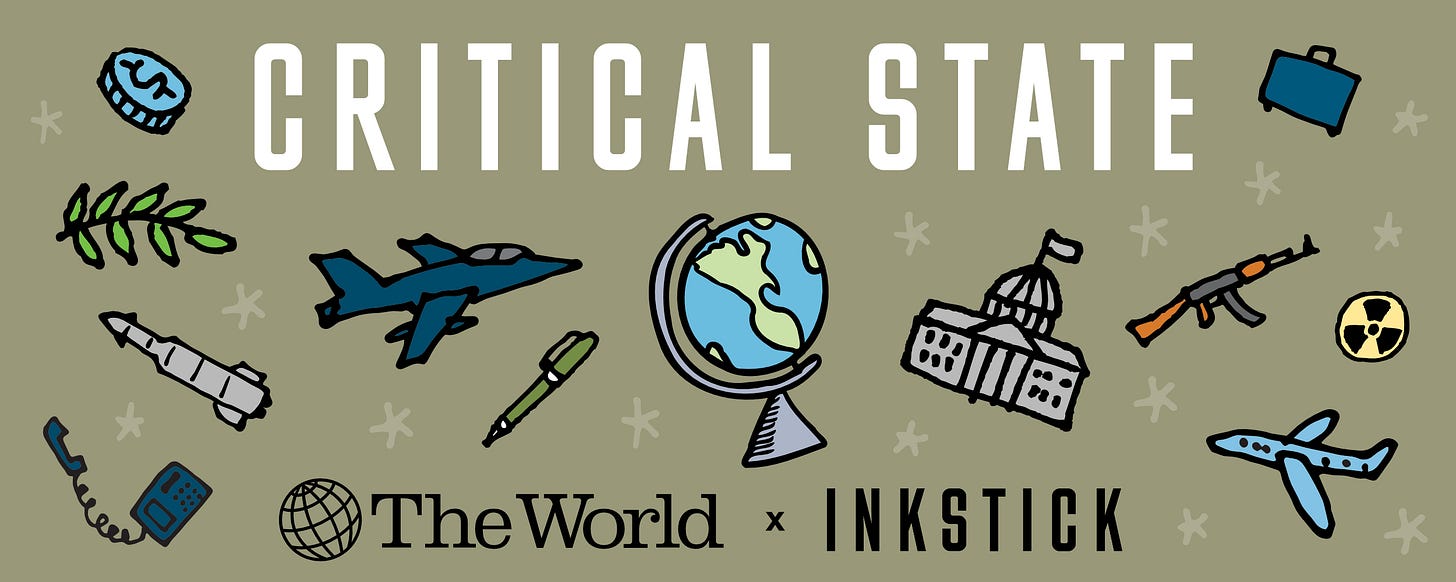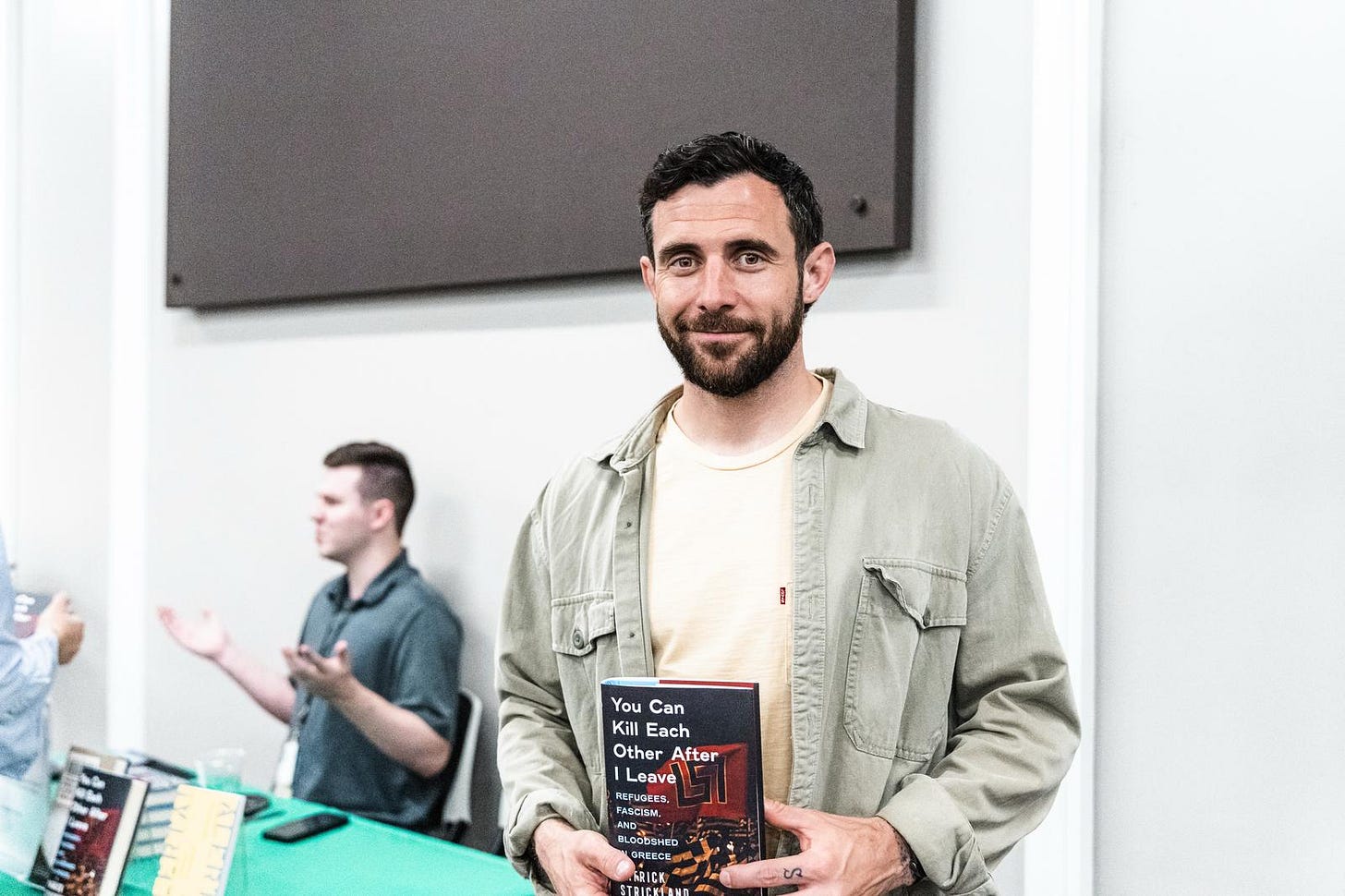Critical State: It’s Worse than the Red Scare, Actually
If you read just one thing this week … Trump’s war on Palestine solidarity.
At The Nation, Saree Makdisi dives deep into the Trump administration’s crackdown on Palestine solidarity activists on American university and college campuses around the country.
Many outlets, Inkstick included, have likened the harsh clampdown on these protesters to the Red Scare, but the way Makdisi sees it, it differs from McCarthyism in some very crucial ways. The anti-communist hysteria of the second Red Scare, after all, was promoted as a way to protect the country against the spread of communism.
The current “campaign of brute intimidation ravaging campuses across the country,” Makdisi wrote, “is not being framed as a way of safeguarding the American government or political system.”
Rather, the Trump administration’s punitive attacks on solidarity are “intended to protect a distant foreign regime and to shield it from criticism in the country whose taxpayers are increasingly unwilling to finance its system of apartheid and its program of genocidal violence.”
Makdisi pointed out that none of those the Trump administration has targeted even stand accused of criticizing the United States.
“Even now, in this gathering darkness, you can stand with a bullhorn in the middle of any American college campus, say what you want about Donald Trump or the American government, and not fear that you will be kidnapped by the state,” Makdisi went on, adding: “Instead, what Trump’s targets are alleged to share is their criticism of Israel’s genocide in Gaza and their advocacy of universally acknowledged Palestinian rights.”
If You Read One More Thing: Capitol Riot Revenge
At the Southern Poverty Law Center’s Hatewatch, Calum Farley and Rachel Goldwasser investigated the US Capitol riot participants who received pardons and are now “looking for retribution.”
More than 1,600 people charged or convicted in cases related to the Jan. 6 Capitol riot received pardons or commutations. That includes prominent leaders of the Oath Keepers militia and the far-right Proud Boys group.
Enrique Tarrio, of the Proud Boys, went on conspiracy theorist Alex Jones’s program not long after he received a pardon and called for the arrest of former attorney general Merrick Garland.
Ivan Raiklin, a veteran, far-right anti-vaxxer, and self-described “secretary of retribution,” has put together “a ‘deep state target list’ that includes more than 300 lawmakers, members of the media, people in law enforcement (including the FBI and US Capitol Police), and their families.”
A number “of the people who were pardoned are seeking retribution against those they think have wronged them in the past by pursuing litigation and talking about doxing their perceived enemies.”
Unclearview AI

At the Greece-based investigative outlet Solomon, Lydia Emmanouilidou reported on the relationship between the American startup Clearview AI (known for facial recognition software) and European governments.
The European Union has a reputation for its reportedly stringent data privacy laws. European regulators have hit Clearview AI with fines worth tens of millions of euros. In Greece, for instance, data protection authorities fined Clearview to the tune of 20 million euros in 2022 after it “illegally harvested and processed the personal data of Greek citizens” in violation of EU law. Italy, the Netherlands, and France, for instance, have also lobbed similarly high fines at Clearview.
Still, Clearview hasn’t forked over any money, per the joint investigation by Solomon and Italy’s IrpiMedia. “Despite mounting fines and explicit bans, the company appears to continue exploiting European data with little consequence.
Deep Dive: Global Executions
Death sentences and executions are always dark news. Despite global advocacy against lethal punishment, though, the use of executions has skyrocketed once again.
A new Amnesty International report found that the number of executions around the world in 2024 hit the highest level in a decade, a grim tally that came as leaders weaponized the death penalty “under the false pretense that it would improve public safety or to instill fear among the population.”
The total number of executions has risen, but the number of countries implementing death sentences has actually remained the same. That’s because, in part, Iran, Iraq and Saudi Arabia were behind 91% of the recorded executions last year.
Altogether, authorities in 15 countries across the world executed more than 1,500 people in 2024. In many cases, the authorities targeted protesters and specific ethnic groups, and there was an increase in executions stemming from drug-related crimes.
The true number of executions, in fact, might be far higher. Amnesty believes that China, the “world’s lead executioner,” has executed thousands of people, as have North Korea and Vietnam. On top of that, war and instability in Palestine and Syria mean Amnesty was unable to pin down an accurate number of executions in those countries.
As far as countries where a tally was possible, Iran led the number of executions, killing at least 972 people and accounting for nearly two thirds of the world’s executions.
Meanwhile in Iraq, the number of executions the country’s authorities carried out quadrupled when compared with the previous year. In Saudi Arabia, the annual total doubled.
In those countries and elsewhere in the Middle East, authorities used the death penalty to “silence human rights defenders, dissidents, protesters, political opponents, and ethnic minorities.”
Amnesty International’s secretary general, Agnès Callamard, said: “Those who dare challenge authorities have faced the most cruel of punishments, particularly in Iran and Saudi Arabia, with the death penalty used to silence those brave enough to speak out.”
The United States didn’t get off the hook, either. The number of executions the US has carried out since the COVID-19 pandemic has steadily risen, but more concerning to Amnesty was President Donald Trump’s frequent assertions that the use of the death penalty will keep the population safer.
“His dehumanizing remarks promoted a false narrative that the death penalty has a unique deterrent effect on crime,” the report pointed out.
Worrisome though the trend is, the report did sound off a note of optimism. At least 113 countries around the world are “fully abolitionist,” while 145 have ditched the death penalty “in law or in practice.”
Zimbabwe, for instance, signed into law a ban on the death penalty for “ordinary crimes” last year, and legal reforms in Malaysia meant that sharply reduced the total number of people who could potentially face the risk of execution.
The way Amnesty’s Callamard put it, organizing has gone a long way toward stigmatizing the use of executions. “When people prioritize campaigning for an end to the death penalty,” Callamard said in the report, “it really does work.”
Show Us the Receipts
At Inkstick, longtime contributor Mohammed Ali, who writes under a pseudonym, filed a harrowing dispatch on Israel’s ongoing war in the Gaza Strip and the difficulties of preserving his memory of a place that is now being destroyed. “The name Rafah once evoked images of sea-breeze evenings, Friday picnics under fig trees, and streets so familiar they felt like the palm of my hand,” he wrote. “Now, the name echoes differently — I hear evacuation orders, war maps, and headlines forecasting its erasure.”
Meanwhile, Inkstick fellow Nell Srinath reported on a recent slate of temporary layoffs and mandatory furloughs that the Connecticut-based defense giant Pratt & Whitney hit workers with. “Connecticut is the birthplace of America’s private defense industry,” Srinath reported, later adding: “The small state nowadays has an outsized reliance on Pentagon spending, ranking as the third-most economically dependent state nationwide.”
At The World, Manuel Rueda spoke with migrants the US has deported to Panama, most of whom are from Africa, Eastern Europe, the Middle East, and Asia. Despite their asylum claims, the Trump administration shipped around 300 to Panama. “Now, these asylum-seekers are in limbo because it’s not clear if they can stay in Panama,” Rueda explained, “but it’s also dangerous for them to return to their home countries.”
Inkstick Bonus Stuff
How am I doing, you ask? Well, I did a pair of talks in North Texas about my new book, which Melville House released into the world last week. You Can Kill Each Other After I Leave: Refugees, Fascism, and Bloodshed in Greece draws on nearly a decade of reporting on the Greek far right, the refugee crisis in the country, and the people who have fought back against anti-migrant violence. But beyond a little horn-tooting, I wanted to just celebrate how many students came out at the University of North Texas and asked important questions about how to actually get started as a journalist in today’s world, how to make ends meet, and whether it’s worth the risks.
Critical State is written by Inkstick Media in collaboration with The World.
The World is a weekday public radio show and podcast on global issues, news, and insights from PRX and GBH.
With an online magazine and podcast featuring a diversity of expert voices, Inkstick Media is “foreign policy for the rest of us.”
Critical State is made possible in part by the Carnegie Corporation of New York.






